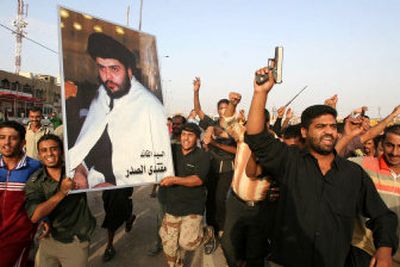Al-Maliki tells troops to take down barriers

BAGHDAD, Iraq – Moving to wrest control of his army from the United States, Iraqi Prime Minister Nouri al-Maliki ordered U.S. forces to take down the barriers they’d built in their search for a missing U.S. soldier and to end the blockade of Baghdad’s largest Shiite Muslim district.
U.S. officials complied, a development hailed as a victory by supporters of Shiite Muslim cleric Muqtada al-Sadr, whose Mahdi Army militia is suspected of kidnapping the soldier.
The action was the starkest sign yet of the differences that divide U.S. officials, who’ve urged al-Maliki to disarm al-Sadr’s militia, and al-Maliki, whose hold on power depends at least partly on al-Sadr and his control of parliament’s largest voting bloc.
For the past week, al-Maliki has been openly critical of U.S. policies in Iraq. He rejected assertions by U.S. Ambassador Zalmay Khalilzad that he’d agreed to a timetable for disarming militias and making other changes. He blamed the U.S.-led coalition for the violence sweeping his country. He criticized U.S. tactics in efforts to arrest death-squad suspects. He said the United States was misguided in singling out the militias as the greatest threat to Iraq instead of Sunni insurgents and former supporters of Saddam Hussein.
On Tuesday, he went further. Referring to himself as commander of the armed forces for the first time in his nearly six-month tenure, al-Maliki issued a mid-day statement ordering U.S. and Iraqi forces to tear down barricades surrounding Sadr City by 5 p.m. and to stop searching cars entering the Karrada neighborhood in central Baghdad, where the soldier was kidnapped.
In Washington, White House spokesman Tony Snow dismissed any suggestion of a rift. “To deal with checkpoints does not necessarily change the situation in terms of how you deal with Sadr City,” he said.
But White House concern over al-Maliki’s stands was evident in the decision to send National Security Adviser Stephen Hadley to Baghdad on Monday. Hadley met with al-Maliki and his security chief, Mouwafak al-Rubaie.
Al-Sadr supporters immediately celebrated the end of the barricades, and Sadr City residents cheered in the streets as Iraqi and U.S. soldiers took down the barbed-wire barricades and drove away in Humvees and Stryker armored vehicles.
The U.S. military announced the deaths of two soldiers in fighting in the Baghdad area Monday, one from small-arms fire, the other from a roadside bomb. The October death toll stood at 103, the fourth-highest monthly figure of the war.
More than 40 Iraqis were killed or found dead across the country Tuesday.